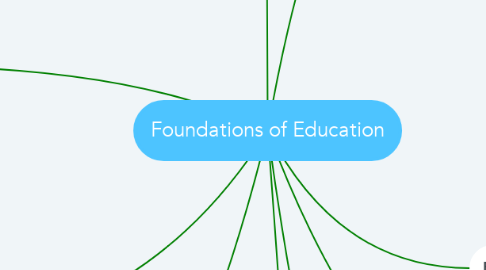
1. Politics of Education
1.1. Four Purposes of Education:
1.1.1. Intellectual gain
1.1.1.1. To provide cognitive and higher-thinking skills
1.1.2. political knowledge
1.1.2.1. To educate the students of the current political order in order to participate in society
1.1.3. Social understanding
1.1.3.1. To promote social unity and socialization among the students into their society in order for it to remain stable or gain stability
1.1.4. Economic knowledge
1.1.4.1. This gives students the skills to navigate into the current economic systems of society
1.2. The role of the School
1.2.1. Creating the type of society we wish to live in and the type of people we wish to live in it
1.3. Explanations of unequal performance
1.3.1. The inequality of the economic standings of individuals along with possible learning disabilities can create situations of unequal performance
1.4. definition of educational problems
1.4.1. Inequality among differing cultures and societal growth rates create educational problems. The educational system promotes inequality of both opportunity and results.
2. History of U.S. Education
2.1. The reform movement of the "Education for All" and the formation of public high schools and secondary education made it possible for so many more students had the chance to attend secondary education institutes. The legalization of the Compulsory School Laws also made the education of the youth in the country as a whole more stabilized.
2.2. Dewey's interpretation of education was to promote growth. He believed that the school should reflect the "completeness" and "unity" of "the child's one world."
3. Equality of Opportunity
4. Educational Inequality
5. Educational Reform
6. Sociological Perspectives
6.1. Theoretical Perspectives on the relationship between school and society
6.1.1. Functionalism stresses the interdependence of the social system. They focus on what it takes to make society, as a "machine," work. They use shared values of individuals to promote secondary education.
6.1.2. Conflict theory focuses on how dominant groups stress power over subordinate groups to make society function. The glue of society is economical, political,cultural, and military power.
6.1.3. Interactionalism uses a macrosociological level of analysis. It is somewhat a mixture of both functional and conflict theories, but focuses on the every day interactions of students with their peers and points of authority.
6.2. Five effects of schooling on individuals
6.2.1. 1. Knowledge
6.2.2. 2. Attitude
6.2.3. 3. Employment opportunities
6.2.4. 4. Education
6.2.5. 5. Mobility
7. Philosophy of Education
7.1. Pragmatism
7.1.1. The generic notions of pragmatism are instrumentalism and experamentalism.
7.1.2. George Sanders Pierce, William James, and John Dewey
7.1.3. The goal of pragmatism is to prepare students to improve the social order and to function in a democratic society.
7.1.4. The role of the teacher in pragmatism is to be a facilitator. The teacher encourages, offers suggestions, questions, and helps plan and implement courses of study.
7.1.5. The pragmatist method of instruction is the problem-solving or inquiry method.
7.1.6. The pragmatist curriculum is an integrated curriculum. It uses the academic and vocational disciplines in an integrated way.
8. Schools and Organizations
8.1. stakeholders in your district
8.2. elements of change
8.2.1. school processes
8.2.2. school cultures

